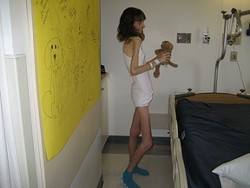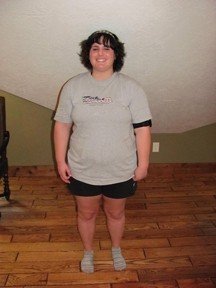'The Biggest Loser' confirms its name
True winners should focus on health, both mental and physical
By Brittany Burgunder[{
"name": "Ad - Medium Rectangle CC01 - 300x250",
"id": "AdMediumRectangleCC01300x250",
"class": "inlineCenter",
"insertPoint": "8",
"component": "2963441",
"requiredCountToDisplay": "12"
},{
"name": "Ad - Medium Rectangle LC01 - 300x250",
"id": "AdMediumRectangleCC01300x250",
"class": "inlineCenter",
"insertPoint": "18",
"component": "2963441",
"requiredCountToDisplay": "22"
},{
"name": "Ad - Medium Rectangle LC09 - 300x250",
"id": "AdMediumRectangleLC09300x250",
"class": "inlineCenter",
"insertPoint": "28",
"component": "3252660",
"requiredCountToDisplay": "32"
}]
Lose weight and win a quarter of a million dollars. It’s a clear win-win, isn’t it?
For 15 seasons, the hit show The Biggest Loser has named the person who sheds the most pounds its big winner. This season’s winner, Rachel Frederickson, showed viewers the darker side to the contest. She stepped onto the stage at the finale looking gaunt and on the verge of anorexia. The show’s trainers were visibly shocked. Social media blew up. Even supporters of the show commented that Frederickson wasn’t an inspirational winner because they believed that she had taken the weight loss too far.
It is more socially acceptable to be thin or underweight, and The Biggest Loser echoes that loud and clear. The goal of the show is for the contestants to lose as much weight as possible. Frederickson “won” the contest and the money, but at what cost? At 5-foot-5 and 105 pounds, her body mass index is below what the National Institutes of Health considers healthy.
In my opinion, it’s not humanly possible to lose 60 percent of one’s body weight like Frederickson did in just 7 1/2 months without using life-threatening measures. And I, personally, know about deadly and drastic efforts to be thin.
At the beginning of 2009, it looked as if I had finally lost my eight-year battle with anorexia and exercise addiction. After years of residential care at the best treatment centers, I was dying. At 5-foot-5-inches (ironically the same height as Frederickson), I was 56 pounds, had lost all mobility, faced liver failure, and had edema, impaired vision, hypothermia, infections, and heart abnormalities. My parents planned my funeral. The doctors told them that if I were lucky enough to survive, I would live the rest of my life in a wheelchair with osteoporosis and brain damage. I guess God had other plans for me, because I pulled through. Nevertheless, I spent the next five months in treatment centers more miserable and trapped than ever.
On Aug. 15, after eight years of controlling, resisting, and depriving myself of food, I gave in and binged. It was the most exhilarating, wonderful, and scariest feeling I’ve ever experienced. I was then 75 pounds. The problem, though, was that I simply traded anorexia for bingeing. By the middle of 2010, I had hit rock bottom once again—this time on the opposite side of the scale. I ballooned up to 221 pounds.
I decided that the solution would be fitness or “fat” camps so that I could drop the weight that had made me so miserable. It was The Biggest Loser without the cameras or the financial incentive. In other words, I searched for a quick fix. Although my eating disorder had taken on a new shape, I learned that it was still driven by nonexistent self-esteem, poor coping skills, and deep-rooted core issues.
Based on my experience with eating disorders and fitness camps, it pains me that The Biggest Loser is such a popular show. I believe the program is a magnet for eating disorders and can only fuel bad behaviors and unhealthy choices. It makes for entertaining TV to watch: screaming, yelling, and seemingly magical transformations. However, what the show is really doing is telling our society that diets and over-exercise are the way to happiness, fame, and money at the risk of one’s health. And the drastic methods for weight loss guarantee that contestants will fail because they will not be able to sustain their “success.”
Frederickson isn’t to blame, and neither are the trainers. Rather, NBC and the producers of the show became fully responsible the minute they decided to turn The Biggest Loser into a nationally aired series. Unfortunately, due to the reach and power of the media, the program is not only negatively affecting the contestants, but it’s also encouraging vulnerable members of the public to engage in dangerous behaviors.
Just recently, binge eating disorder (BED) was officially recognized as an illness in the Diagnostic and Statistical Manual of Mental Disorders (DSM-5). This is an enormous milestone to assist those in need to get appropriate help, especially because eating disorders have the highest mortality rate of all mental illnesses.
Fitness can be an important component of treatment for an eating disorder, but any program must incorporate therapy, nutrition counseling, and appropriate weight goals so that the progress is sustainable. Unfortunately, the premise of The Biggest Loser fails to acknowledge the holistic requirements for a successful outcome.
How can The Biggest Loser change to make a real and lasting inspiration? Base the winner on true indicators of health, both mentally and physically. It was only with tremendous amounts of inner psychological work, support, practice, patience, setbacks, and courage that I overcame the seemingly impossible. The healthy balance I found should define the true “winner.”
Brittany Burgunder is a San Luis Obispo resident finishing a book proposal titled 'I’m Possible: A Memoir of Hope,' detailing her battle with a severe eating disorder for more than 10 years. From anorexia and weighing 56 pounds to binge eating and weighing 221 pounds, she’s now healthy and enjoys playing competitive tennis and competing in dressage. Send comments to the executive editor at [email protected].
Do you support the local fishermen's decision to sue over wind farms?
Latest in Commentaries
Readers also liked…
-
A happy ending
Sep 22, 2022 -
SLO County's response to Los Osos mudslide highlights a lack of representation
Feb 16, 2023







March 05, 2014 Opinion » Commentaries